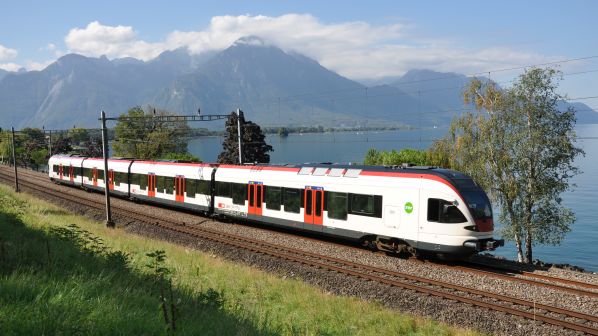ABB has been supplying electrical components for more than a century, but as the rail industry becomes more digitalised, the company is updating its offer and developing new technologies to keep abreast of these advances.
ABB’s product range traditionally includes traction transformers, motors and converters for electric vehicles; generators and turbochargers to boost the efficiency and power of diesel trains; circuit breakers, contactors, connection devices and other types of electronic relays and timers for onboard applications; and power system solutions including traction substations that feed and distribute electricity to the lines, as well as high- and medium-voltage switchgear, converters and transformers.
"The transport market is a key area the company is looking to target, and the group is developing a range of solutions with rail specific functionality."
Claus Vetter, ABB’s grid automation products global product group manager
ABB is also developing and delivering technologies and solutions designed to improve power quality and protect the network from voltage disturbances, while also drawing more information from the grid to optimise operations.
Mr Claus Vetter, ABB’s grid automation products global product group manager, says the transport market is a key area the company is looking to target, and the group is developing a range of solutions with rail specific functionality.
Earlier this year, Swiss Federal Railways (SBB) signed a three-year framework contract with ABB, which includes an option for two years, to supply power protection and support for the Swiss network.
ABB will supply its new Relion RER670 Intelligent Electronic Device (IED), which is used for the protection, control and monitoring of the transmission lines as well as transformers in a two-phase 16.7, 50 and 60Hz power rail supply system, which supports isolated, compensated and solidly earthed networks.
RER670’s line protection covers distance protection functions providing high flexibility with quadrilateral or mho starting characteristics. The system also includes transformer protection for two-phase to two-phase as well as two-phase to one-phase transformers, with a range of backup functions.
Specific to rail, the RER670 includes catenary distance protection for catenary feeders, while transformer tank protection helps avoid damage caused by short circuits to the transformer tank.
A wide range of control functions can be included in RER670 to either complement the line or transformer protection IED with advanced control functions or to provide a control IED with optional backup protection.
RER670 allows for IEC 61850 Edition 2 communication to substation automation systems, along with horizontal communication between IEDs.
The contract to supply the Relion system to SBB marks a major step forward for ABB’s strategy to target the transport industry, and the rail industry in particular.
“We have delivered it before in smaller quantities but it’s the first major contract that we could win with this part of the portfolio,” Vetter says. “It’s a new product based on a very proven platform, the Relion platform which we use in general power system protection control applications for utilities and power girds. What we did is we basically used our proven platform and implemented specific applications for the rail industry.”
Global market
While the company has a large presence in Europe, Vetter says it is targeting the global market and has implemented solutions in India, China and Malaysia.
“You will always find specific requirements and regulations in different regions,” Vetter says. “While we have a general product available we will then augment or adapt the portfolio to meet the specific needs of the industry.”
"One area which we are looking at specially, which goes beyond the rail industry, is cyber security, especially on our communication solutions"
The digitalisation of a system invariably opens it up to cyber-attacks, but ABB is developing solutions to combat this problem.
“One area which we are looking at specially, which goes beyond the rail industry, is cyber security, especially on our communication solutions,” says Vetter. “We’ve added a specific cyber security solution so we can fulfil not only the application requirements but also the data privacy and data protection requirements for our customers.”
As more railways switch to electric traction to reduce their carbon footprint, there is a greater emphasis on sourcing green energy.
“In general I would say there’s a global need for what we call a smarter and greener grid,” Vetter says. “We’re seeing a stronger need to integrate various sources of energy in the grid and we want to give more information at the end of the day to the customer so they can steer their power consumptions to have a better carbon footprint.
“We’ve come from an industry where we had a very stable electricity grid and nowadays with the different energy sources there’s a lot more instability, there’s a lot more need for automation and control, and a lot more need for information coming out of the grid. This is what we’re trying to address with our current portfolio.”

